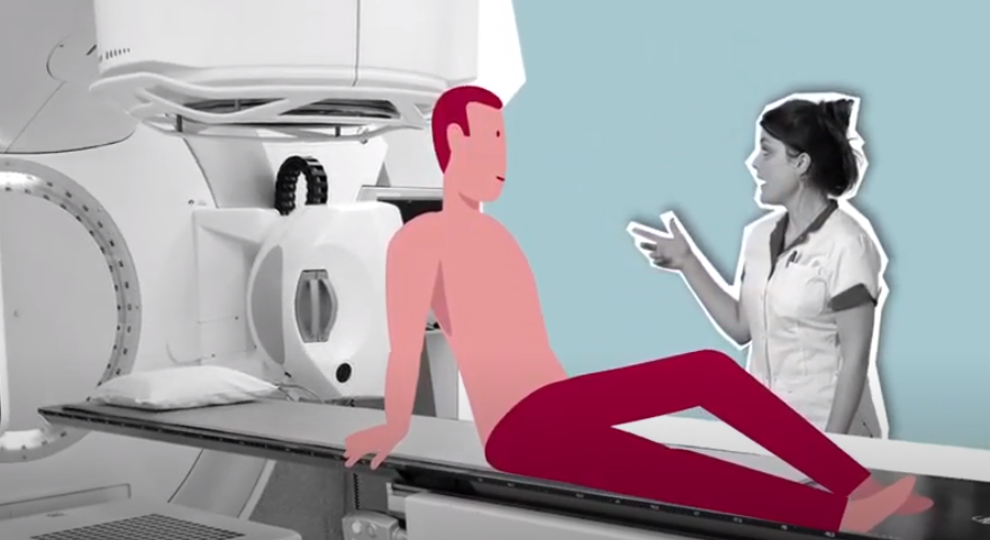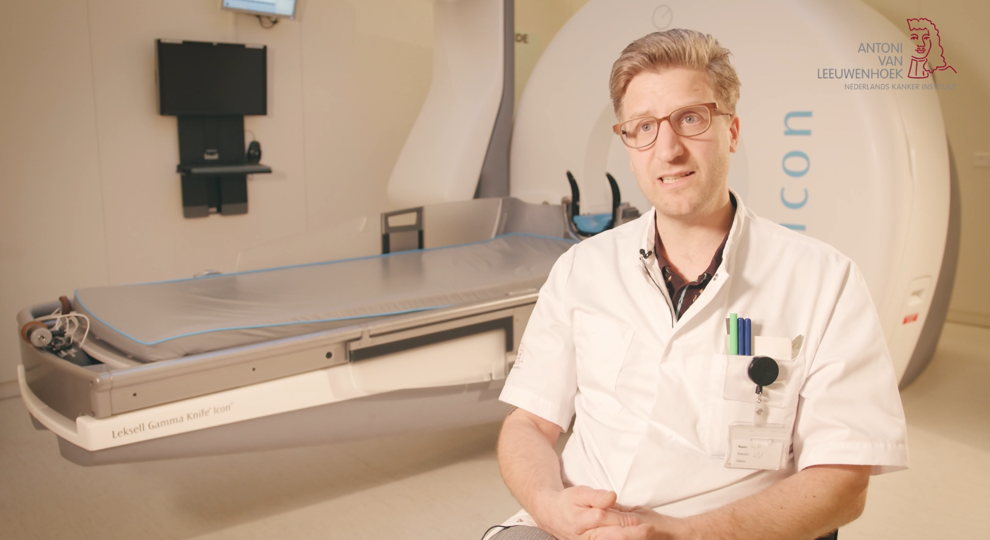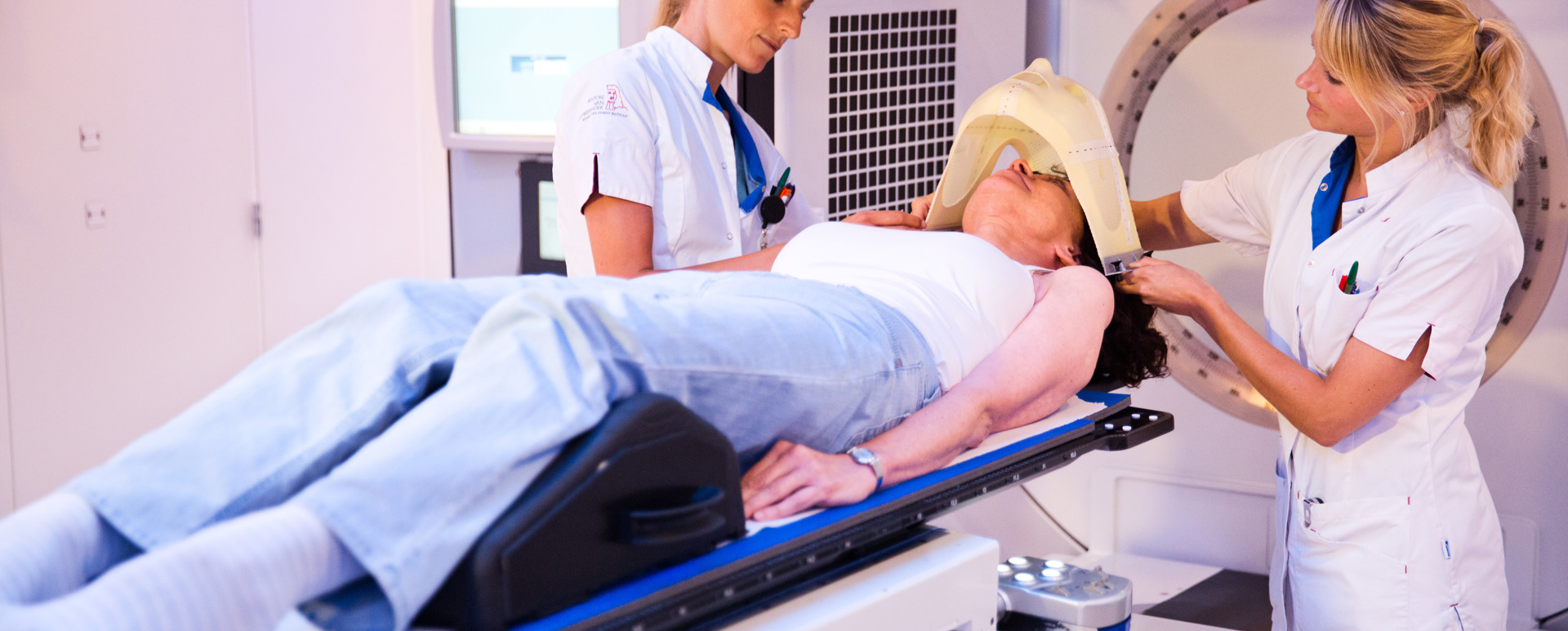Radiation therapy for brain metastases
A tumor elsewhere in the body that has spread to the brain is called a brain metastasis. Radiation aims to treat the symptoms, shrink the tumor, halt its growth, or make sure that all tumor cells in the area are destroyed. The external beam radiotherapy will be delivered to the entire brain, or the tumor’s location only (stereotactic radiosurgery). We always use the latest techniques in our treatment and use a linear accelerator and Gamma Knife in the delivery of our external beam radiation therapy.
You will receive 1 to 5 treatment sessions. The time of the preparation, procedure and delivery of radiation depend on your personal situation and the machine used.
Our working methods
The latest techniques and advanced technology
Our Radiation Oncology Department is constantly working on the development of new techniques using the most advanced technology currently available - both in diagnostic imaging, preparation, and radiation itself. This allows us to deliver the most effective treatment possible to you, while sparing as much healthy tissue as possible.
Consultation with your radiation oncologist
You will meet with your radiation oncologist to discuss your situation and the treatment that best fits you, its goal, expected outcome preparation, execution, and side effects.
Multidisciplinary team meeting
Your situation, test results and medical history will be discussed in a multidisciplinary team meeting consisting of specialists such as gastroenterologists, surgeons, and radiation oncologists, in order to find the treatment that best fits you. Your radiation oncologist will discuss the results with you.
Research
We are constantly working to improve and develop radiation treatment through research. if your radiation oncologist knows of a trial that you may qualify for, he or she will let you know. You will receive more information to make an informed decision. Your participation is voluntary. if you decide not to participate, you will be treated according to the latest protocols and developments.

More information
Preparations
The preparations for your reatment depend on the type of machine we will use.
For radiation with the Gamma Knife, we will make a frame or a mask. You will also have an MRI scan.
For radiation with the linear accelerator we will make a mask. You will also have a CT scan and/or an MRI scan.
We will provide information about the treatment during your preparatory consultation. There will be plenty of room to ask questions.
Radiation treatment planning
Your radiation oncologist or Physician Assistant will draw the placement of the radiation field on these CT and/or MRI scans. He or she will calculate the optimal external beam radiation using special software: the treatment planning. It is important to ensure that the field receives the correct dose and that the surrounding tissue is spared as much as possible.
Developing a radiation treatment plan for the Gamma Knige can take between 30 minutes and several hours. Once completed, we can estimate your treatment time. For most Gamma Knife sessions, the tital time of the session will be between 10 minutes and 2 hours.
For the linear accelerator, the total time will be between 15 and 30 minutes, depending on your treatment.
Radiation
Radiotherapy lab technicians ensure that you are positioned correctly on the table. They will connect the mask or frame to the table on which you will be lying down.
We will closely monitor you on camera during your treatment. If you are treated with the Gamma Knife, you will also have an alarm bell.
Check-ups with your radiation oncologist
During your treatment you will regularly meet with your radiation oncologist to discuss the progress and ask any questions you may have. Your radiation therapist will offer advice on how to deal with the side effects you are experiencing and prescribe medication if needed. You will also hear about the next step after your treatment.
Side effects
The side effects you will experience depend on your personal situation, overall shape and health, and the area that is receiving the treatment. Your practicing physician will discuss the side effects you can expect with you.
Follow-up care
If you would like extra care during or after your treatment, please ask your radiation oncologist or physician assistant to the NKI Survivorship Center. Our sexuologists, physical therapists, occupational therapists, dieticians, social workers, and psychologists are experienced in care for cancer patients and would love to offer additional support during and after your treatment. .


 nl
nl
 Nederlands
Nederlands
